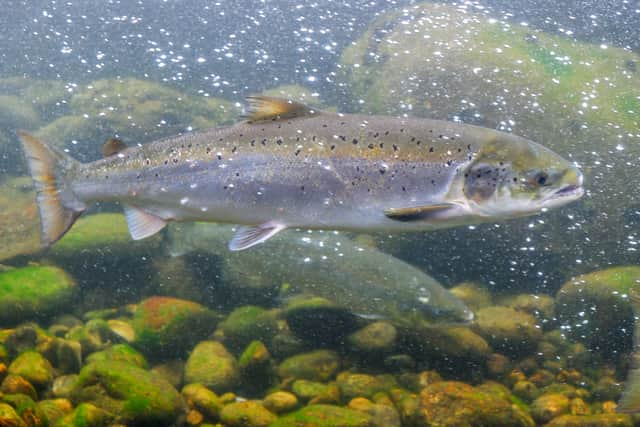Scots innovators clean up with detergents made from salmon farm waste
Soon you will be able to clean your home with them too.
An innovative new Scottish firm is creating earth-friendly detergents from fish oil, a by-product of the country’s fish farming industry.
Start-up company Eco Clean Team is working on a pioneering research project to develop a new process to make surfactants, one of the main components in detergents and other industrial and institutional cleaning products.


Advertisement
Hide AdAdvertisement
Hide AdThe founders say the new bio-based process, developed by researchers at the University of St Andrews, is more cost-effective, efficient and eco-friendly than traditional methods of producing the valuable chemical compounds.
The next stage of development will ensure the novel method is replicable, straightforward to implement and allows the products to be manufactured in high volumes.
The initiative builds on the success of a feasibility study that was jointly funded by the Industrial Biotechnology Innovation Centre (IBioIC) and Sustainable Aquaculture Innovation Centre in 2020.


Now Eco Clean Team has been awarded a six-figure sum from the IBioIC to take the project forward.
“I was born and grew up in Tarbert, Loch Fyne, so aquaculture and fishing are close to home for me and I have seen first-hand the importance of both to communities in Scotland,” said Eco Clean Team co-founder and director Mark Hamilton.
“However, as the sector grows it needs to do so sustainably, and we believe this project is just one example of a new valuable solution that can come from its by-products.
“While working on a project for the development of a new cleaning product, I began to look at how one of the core ingredients could be produced in a more sustainable way.
“This developed into the project Eco Clean is working on today.
Advertisement
Hide AdAdvertisement
Hide Ad“This next stage in our research represents a critical step in the process of development then scaling up the production of our sustainable surfactant.
“We have already proved the feasibility in a previous study and hope that, by the end of this project, we will find ourselves closer to full-scale commercialisation and seeing the surfactant used in a range of industrial and selected household products.”
Scotland’s aquaculture sector currently produces around 192,000 tonnes of Atlantic salmon each year, as well as sea trout, other fish and shellfish.
Salmon is the country’s top food export, worth around £450 million to the economy.
There are plans to grow the market, increasing annual production to around 350,000 tonnes by 2030.
The sector is working to reduce and reuse its by-products – for example, in the formulation of biodiesel.
But experts believe the Eco Clean Team project could unlock an opportunity to create higher-value sustainable products with a long-term application.
Surfactants – or surface active agents – are used in detergents to disrupt the surface tension on the item being cleaned, helping to trap and remove dirt.
Advertisement
Hide AdAdvertisement
Hide AdDifferent types are used as wetting agents, emulsifiers and foaming agents for a range of products.
Dr Alfredo Damiano Bonaccorso, senior research fellow at the University of St Andrews, has been experimenting with uses for fish by-products for some time.
He said: “This project with Eco Clean is an excellent case study of how research can help a novel company to develop an idea by transferring insight and knowledge from academia to industry.
“The first time I met Mark, he was full of enthusiasm for the idea, keen to develop a sustainable method for producing cleaning products.
“I was already using fish oil waste to produce biofuel, so decided to explore a similar process and feedstock to produce a bio-based surfactant and we were pleased to see success from the initial feasibility study.”
Liz Fletcher, director of business engagement at IBioIC, added: “Bio-based alternatives to petrochemicals will be an essential part of meeting global sustainability targets, and there are wide-ranging opportunities to use natural feedstocks that one industry might consider by-products as the building blocks for new products and chemicals.
“Eco Clean is a great example of a Scottish company helping to grow our bioeconomy by seizing the opportunities biotechnology presents to create more sustainable products.”
A message from the Editor:
Thank you for reading this article. We’re more reliant on your support than ever as the shift in consumer habits brought about by coronavirus impacts our advertisers.
If you haven’t already, please consider supporting our trusted, fact-checked journalism by taking out a digital subscription.
Comments
Want to join the conversation? Please or to comment on this article.
